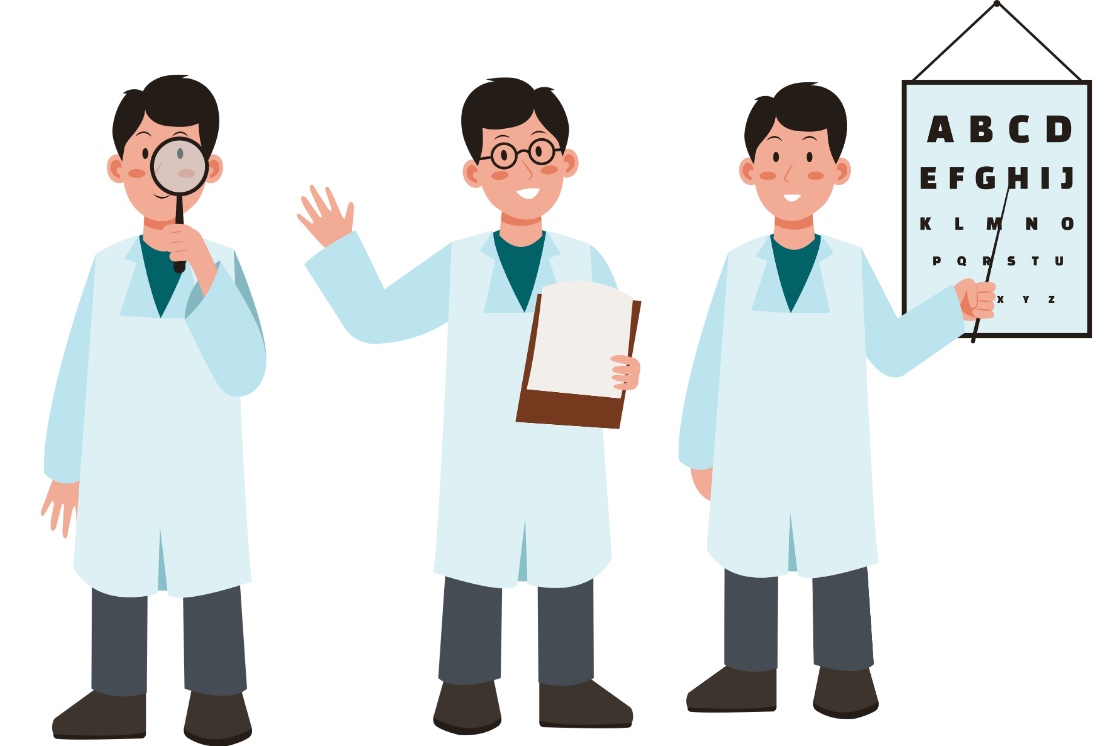There is no doubt that eyes are one of the most precious and sensitive organs and need a great deal of caution. The World Health Organization (WHO) reports that approximately 2.2 billion people worldwide experience some form of visual impairment, including blindness. Research indicates that many of these instances could have been avoided or significantly reduced if patients had sought timely treatment. In this article, we will explore how significant the work of an ophthalmologist is, what makes it unique from any other occupation in the field of eye care, and how facilities can be accessed so as to keep one’s eyes healthy.
What Is an Ophthalmologist?
Definition And Role
Ophthalmologists are specialists who are trained medically to assume almost total responsibility for the functionality and health of the eyes. Unlike optometrists or opticians, ophthalmologists are qualified to perform surgical procedures, treat severe eye illnesses, and give out medications.
They undergo extensive education and training, including:
- 4 years of medical degree
- 1-year internship
- 3 years of ophthalmology residency
Additional fellowships in the event of interest in sub-specialties such as glaucoma, retina diseases or cornea surgery.
Those patients who suffer from more advanced ocular conditions, such as cataracts or macular degeneration, may be referred for surgical evaluation to an ophthalmologist. Because they have received extensive training, they are capable of providing all-aid- eye medical and surgical care.
Differences Between Ophthalmologists and Other Eye Care Professionals
When it comes to eye care, there are several types of professionals, each serving different roles:
| Profession | Qualification | Primary role | Can Prescribe Medications? | Can Perform Surgery? |
| Ophthalmologist | Medical Doctor (MD) + Specialized Ophthalmology Training | Diagnose, treat, and manage eye diseases, perform surgeries | Yes | Yes |
| Optometrist | Doctor of Optometry (OD) | Conduct vision exams, prescribe glasses/contact lenses, treat some eye conditions | Yes (limited scope) | No |
| Optician | Certification or Associate’s Degree | Fit and adjust eyeglasses and contact lenses | No | No |
When Should You Visit an Ophthalmologist?
Reasons to Schedule an Appointment
Most people can tell the difference between an ophthalmologist and an optometrist, and thus may wonder when they should seek the services of an eye doctor. The optometrist’s qualifications are well-suited for addressing basic eye-related issues such as vision improvement, but certain eye health problems can only be handled by an ophthalmologist. In the light of enjoying reasonable eye healthcare, one might have various factors that would influence seek eye specialist’s attention.
These reasons include but are not limited to the following;
Cataracts: Lenses causing difficult vision due to cloudiness of the structures in the eye.
Glaucoma: A spectrum of eye diseases which results in permanent loss of vision secondary to damage to the optic nerve.
Diabetic Retinopathy: Other than high blood sugars, diabetes does have eye-related constraints.
Macular Degeneration: Degeneration of the macula and related structures due to old age.
Eye injuries: Guidelines regarding management vary based on the extent of injury inflicted on the bulbus. For instance, Where there is extensive trauma to the eye, it is best to see a qualified ophthalmologist.
Preventative Care and Eye Exams
For those people who do not have eyesight issues at the present period, it is suggested that one not only maintains their current status but also books appointments for eye check-ups to ensure healthy eyes. Unlike in the case where certain conditions like hypertension or obesity, there are specific age brackets that recommend more eye checks without the presence of any of these health conditions.
- Middle-aged individuals (40-64 years) should have an eye checkup at least once every year.
- Old Age Persons (65 Years and Older), In this group, it is recommended that eye examinations be conducted once a year.
- Diabetics, Such people should in addition have their eyes examined once a year in screening for diabetic related eye disease. This issue of forgetting eyeglass appointments should not arise.
How to Choose the Right Ophthalmologist

Factors to consider
The selection of an ophthalmologist is equally important as any other thing because your eye health will depend on it.
The following should be taken into account:
Experience: For how long has the particular ophthalmologist been in practice? Do they have skills in treating the specific cases such as glaucoma or cataracts?
Specialties: Some ophthalmologists are more like pediatricians for the eyes or even retinas or optic nerves. Ensure the doctor you go for specializes in the field that caters for you.
Patient Reviews: You can get some perspective on satisfaction from patient reviews. Find the one with eye care that has the most positive reviews.
Also Read: How to Choose the Right Sunglasses: UV Protection and Eye Health
Questions to Ask During Your First Visit
It is important to have a certain degree of trust towards your ophthalmologist and to be sure that he will do all the necessary towards meeting your requirements. Consider asking the following questions during your first appointment;
- What are my treatment options?
- What is your experience with my specific condition?
- How often will I need to be seen for follow up care?
- What can I do in order to keep my eyes healthy?
The Importance of Eye Health
Statistics on Eye Health
It is necessary and essential to ensure good eyesight and vision at all times, even more so for the aging population.
The American Academy of Ophthalmology Studies (AAO) research reveals that:
- One in three individuals other than the blind will develop visual impairment due to eye disease by 65 years of age.
- Diabetes led to 90% of blindness, which could be controlled through early intervention and treatment.
- Such figures help in educating the audience on the importance of these practices, and the need for them to undergo routine eye examination is also underscored.
Lifestyle Tips for Healthy Eyes
Healthy vision can also be achieved through making some lifestyle changes apart from regular eye doctor visits:
Balanced meals: Aged-related eye health deterioration can be avoided by including these foods such as omega-3 fatty acids, vitamin c, vitamin E, and zinc in the diet.
Sunglasses are a must: Harmful UV rays can damage your eyes, so it’s important to wear sunglasses that block 100% of both UVA and UVB rays.
Limitations on screen time: Over concentration on the computer for long periods or even a mobile phone is very tiresome to the eyes.
Adhere to the 20-20-20 rule: Every 20 minutes of looking at a screen, take a 20 second break and focus on something 20 feet away.
Also Read: Dry Eye Syndrome Explained: Relief, Remedies, and Treatment Options
Frequently Asked Questions (FAQs)
What is the difference between an optometrist and an ophthalmologist?
An ophthalmologist is a medically trained person capable of performing surgery, while managing medical conditions of the eye such as glaucoma. In contrast this, an optometrist is a person qualified to examine and treat patients’ eyes only in terms of prescription eyewear.
When should I consult an ophthalmologist?
Any adult who is over forty years of age should make it a point to go for eye health assessments within a span of every two years. With regards to the elderly geriatric patients that are sixty-five years, the assessments in question are advised to take place once every twelve months.
What conditions can an ophthalmologist treat?
Ophthalmologist’s practice encompasses several disorders such as cataract, glaucoma, age-related macular degeneration and also diabetic eye disease among others.
Conclusion
Regardless of age or the current state of your vision, it’s essential to prioritise eye health
There is a valid justification as to why one has to do an eye examination every now and then and most importantly at the right time such that any medical conditions that may impair one’s vision are controlled and eye health is preserved. For those of you who have not yet scheduled your eye appointment, it is proper to do it now. Don’t let things get out of hand, turn to the skilled ophthalmologist for help and protect your precious sight. Have you been to an eye doctor lately? Please, let us know in the comments.
Also Read: Natural Eye Health Remedies: Improve Your Vision with Simple, Effective Solution













